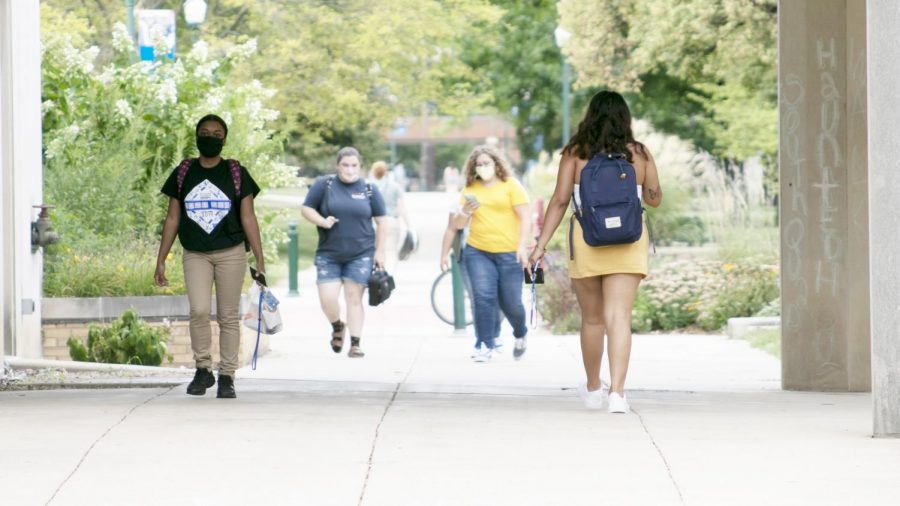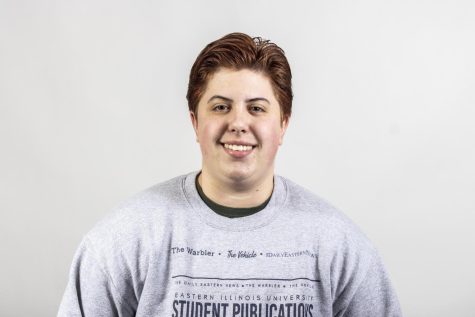Lack of official process creates accessibility challenges at Eastern
Karina Delgado | The Daily Eastern News
Several students walk around campus, going to and from classes on Thursday afternoon as the first week of classes wraps up.
November 30, 2022
Editors and reporters from the News have struggled for two weeks to find details on how Eastern accommodates students with disabilities. After hearing stories about fellow students’ struggles, we knew we were in for a challenge.
We toured campus and determined for ourselves that many areas are inaccessible to people using mobility aids, which comes as no surprise on a campus with older buildings.
How are building accessibility issues handled?
We first began by trying to determine who ensures that buildings are accessible and in compliance with the Americans with Disabilities Act.
The answer appears to be that no official processes to make sure that buildings are accessible are currently in place. Over the summer, the News published an article summarizing access challenges on campus.
Apparently, in response to the spotlight placed on those challenges, an unofficial committee was formed to look into addressing them.
This committee included:
- Anne Flaherty, vice president of student affairs
- Paul McCann, vice president of business affairs
- Ceci Brinker, director of student life
- Justin Richards, a graduate assistant in the student life office
- Lucy Ade, student body president
- Timothy Zimmer, director of facilities planning and management
- Mark Hudson, director of housing and dining services
- Ci Richardson, a senior psychology major and wheelchair user who has advocated for better accessibility on campus
The committee met twice.
Meetings were not announced publicly.
This unnamed committee made recommendations to either Facilities or to Housing and Dining on repairs and updates to sidewalks on campus as well as to the ramp to access Stevenson Dining.
But they did not follow state law. According to the Illinois Open Meetings Act: “citizens shall be given advance notice of and the right to attend all meetings at which any business of a public body is discussed or acted upon in any way.”
Despite not operating in an official way, this committee likely needs to comply with the OMA because it made recommendations for repairs to campus which would use university funding or employee hours.
According to a member of the committee, neither notes nor minutes were taken in either meeting.
We did learn, though, that, a document provided to the committee by Richardson lists inaccessible areas on campus.
Hudson’s updates to the document reveal some planned and completed projects created as a result of these meetings.
What’s Being Done
On behalf of the committee, Hudson also updated instructions for staff members to keep accessible doors unlocked while the MLK Jr. University Union is open, and to ensure that signs be kept out of the way of door openers.
Another suggestion from the committee: creating a plan for allergen-safe foods to be provided in other dining halls after Taylor Dining’s hours were reduced earlier this year.
Some other suggested projects are larger in scope
For example, in August, shower chairs were ordered for all accessible showers in Ford, McKinney and Weller Halls. Grounds workers have been contacted to look into solutions for a dropped sidewalk,creating an oversized step outside McKinney.
A spot in the sidewalk outside Stevenson Dining, which the original document describes as a “3+ inch step” and Hudson’s update describes as a “3/4 inch lip,” was repaired over the summer to make the ramp accessible to wheelchair users.
Hudson also noted there was a “major project to redo this area in the works – hopefully next summer.”
Who should students contact with concerns?
Still, we hadn’t answered our initial questions about the official processes for reporting issues with accessibility on campus.
Eastern’s website mentions Linda Holloway as ADA coordinator, but further research revealed that she is the coordinator for employees, not for students.
We asked multiple members of Eastern administration who confirmed that April Jackson is the current ADA coordinator for students.
Neither Holloway nor Jackson was on the unofficial committee making changes to campus.
Jackson is also the director of Student Disability Services.
In an interview about campus accessibility this summer, Jackson said that her office takes comments from students to make reports about issues with access to different locations or services on campus.
Jackson said that Facilities Planning and Management was in charge of actual building accessibility, such as ramps or automatic doors.
Zimmer, the director of facilities, had been contacted several times over the course of the summer for confirmation and for an explanation of the process for ensuring accessibility, but he did not respond.
After the article about campus accessibility was released, Heather Chism, the alternate media specialist at Student Disability Services, said that the office only handles academic accommodations for students to take their classes, not physical campus accessibility.
Since the publication of that article, Jackson has turned down multiple requests for another interview with staff at the News.
What does this all mean?
Despite non-compliance to current ADA standards, Eastern is likely not breaking any laws.
Administrators are aware of parts of the ADA, which allow buildings once compliant to remain “out of date,” if other renovations are not being made.
Compliance relies on the date of building. Public structures built before 2012 must at least comply with 1991 ADA Standards while post-2012 public structures must comply with 2010 ADA Standards.
If an area is renovated or altered, it must comply to the more rigorous recent standards, up to a level of cost and inconvenience detailed in ADA Title II.
Luke Taylor can be reached at 581-2812 or at deneic@gmail.com.





































































